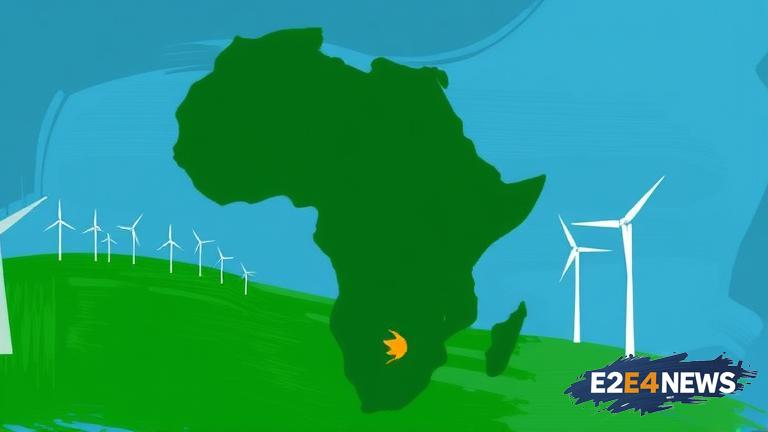The African continent is witnessing a significant shift towards renewable energy, driven by the need to address the pressing issues of energy access, climate change, and sustainable development. With many countries still struggling to provide reliable and affordable electricity to their citizens, renewable energy has emerged as a viable solution. Solar and wind power are leading the charge, with countries like South Africa, Morocco, and Egypt making significant investments in these sectors. The African Union’s ambitious goal of achieving 100% access to electricity by 2030 has further accelerated the adoption of renewable energy. Governments, international organizations, and private sector companies are collaborating to develop and implement renewable energy projects across the continent. The benefits of renewable energy are numerous, including reduced greenhouse gas emissions, improved air quality, and enhanced energy security. Moreover, renewable energy can create jobs, stimulate local economies, and contribute to poverty reduction. However, the transition to renewable energy also poses challenges, such as the need for significant investment, technology transfer, and capacity building. To address these challenges, African countries are exploring innovative financing mechanisms, such as green bonds and crowdfunding. Additionally, regional and international cooperation is crucial for sharing knowledge, expertise, and best practices in renewable energy development. The private sector is also playing a vital role in driving the growth of renewable energy in Africa, with companies like Vestas, Siemens Gamesa, and Enel Green Power investing heavily in the continent. Furthermore, small and medium-sized enterprises (SMEs) are emerging as key players in the renewable energy sector, providing innovative solutions and creating employment opportunities. The African Renewable Energy Initiative (AREI) is another key initiative aimed at supporting the development of renewable energy in Africa. Launched in 2015, AREI aims to achieve at least 300 GW of renewable energy capacity by 2030. The initiative has received significant support from international organizations, including the African Development Bank, the United Nations Environment Programme, and the International Renewable Energy Agency (IRENA). In terms of policy and regulation, many African countries are putting in place supportive frameworks to encourage the development of renewable energy. For example, South Africa’s Renewable Energy Independent Power Producer Procurement (REIPPP) program has been highly successful in attracting private sector investment in the sector. Similarly, Morocco’s renewable energy law has set ambitious targets for the development of solar and wind power. As the renewable energy sector continues to grow in Africa, it is essential to address the issue of energy storage, which is critical for ensuring a stable and reliable energy supply. Fortunately, advances in technology are making energy storage more efficient and cost-effective, with batteries and other innovative solutions being developed to address this challenge. In conclusion, Africa’s renewable energy revolution is gaining momentum, driven by the need for sustainable development, energy access, and climate change mitigation. With the right policies, investments, and international cooperation, the continent can unlock its vast renewable energy potential and achieve a brighter, more sustainable future. The growth of renewable energy in Africa also presents opportunities for knowledge sharing, technology transfer, and collaboration with other regions, such as Europe, Asia, and the Americas. As the world transitions to a low-carbon economy, Africa is poised to play a significant role in the global renewable energy market, with the potential to become a major player in the production and export of renewable energy technologies. Overall, the future of renewable energy in Africa looks promising, with the continent on track to achieve its ambitious targets and become a leader in the global transition to a sustainable and low-carbon economy.
